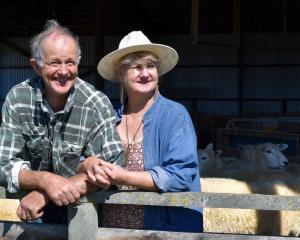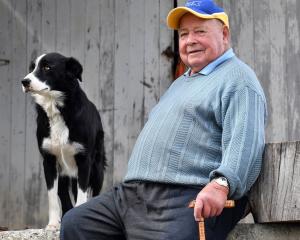
Central Southland veterinarian Mark Bryan will receive a top industry award for his work advancing veterinary science and animal welfare.
Dr Bryan said it was "humbling" to be named the recipient of the 2025 New Zealand Veterinary Association Te Pae Kīrehe president’s award.
"It was completely unexpected."
He will collect the award at a ceremony in Wellington in June.
The VetSouth managing director and Comhla Vet director lives in Winton.
He was born in England and his family moved to Glasgow when he was a boy.
"I’ve always considered myself Scottish."
His childhood dream was to be a ski instructor, but his parents declined his request to pay his tuition fees to make it a reality.
They offered to pay for him to attend university and he qualified to be a vet at the University of Glasgow in 1988.
"I forgot about being a ski instructor, so it was quite a clever move."
His veterinary career began with seven years working in the north of England.
A keen mountaineer and ice climber, his expeditions include the Himalayas and Antarctic Peninsula.

"I really enjoyed it and I thought ‘I could work here’, but I had a job to go back to."
He returned to the United Kingdom and promised himself to one day work in New Zealand.
He declined an offer of a partnership in a British veterinary clinic and moved to New Zealand in 1995, aged 29.
"I knew if I didn’t go then I wouldn’t."
On a working holiday visa, he worked as a vet in Waikato for a year.
After becoming a New Zealand resident, he began working in Winton in 1997, a move prompted by his wife starting a job at Southland Hospital in Invercargill.
"I met her in Waikato and both of us were mountaineers and we both wanted to be working in the South Island."
He had never regretted moving to New Zealand and settling in Southland.
When he began working for Central Southland Vets (now VetSouth) in Southland, he knew of some his clients because he had worked for them in Waikato before they moved South to convert properties to dairy farms.
"It was a time of lots of conversions. There was a lot of growth and it was quite an exciting time."
At the time, the clinic’s 25 clients were running about 10,000 cows.
"Now we have about 200,000 cows in Winton. The growth has been phenomenal."
While working in Southland he gained his master’s degree in epidemiology by studying extramurally part-time for four years at Massey University in the early 2000s.

The qualification allowed him to do more research and incorporate it in the business.
He had delivered speeches on topics including animal welfare, novel treatments and structuring a veterinary business at conferences in more than 20 countries, including Australia, Argentina, Canada, Chile, France, Holland, Ireland, Mexico, South Africa and United Kingdom.
More than 15 years ago, he launched the initiative "Swede Safari", where a group of Massey University fifth-year veterinary students spend a week in Southland, to showcase farming in the area, in the hope they would consider working in the region.
"That is still going and part of the Massey curriculum and the students look forward to it."
Other initiatives he has delivered included VetSouth offering free services to struggling dairy farmers experiencing record low payouts in 2015.
Farmers could receive a free calving callout and all visits to examine and treat sick cows were free.
"We thought it would be a way to support the community."
Vets attended about 300 free calving callouts and provided support, he said.
"It was a good initiative. We got vets out on farms, it was free and the farmers had someone to talk to. I thought that was all quite important."
He was a member of the NZVA dairy cattle vet committee for nine years, then an NZVA board member for nine years and remains on the Antimicrobial Resistance Committee member, recently stepping down as chairman.
The most challenging time for vets, farmers and the community during his career in Southland was the Mycoplasma bovis outbreak from 2017.
"That was a really difficult time."
Another challenging time was when he raised the alarm about the toxic nature of herbicide-tolerant swedes in 2014.

"We were losing too many cows," Dr Bryan said
Cows’ livers removed in autopsies showed the swedes were the most likely cause.
"That led to a very difficult period with the seed suppliers."
Eventually the seeds were removed from the market.
The years of work to get action taken despite compelling data took its toll.
"It was quite a personal cost."
Another tough time was when there was media attention on the way southern dairy farmers wintered their cows, which was putting many of VetSouth’s clients under pressure.
Despite veterinarians and farmers working hard to do the right thing, the criticism remained.
He had completed work on how to improve the wellbeing of veterinarians, which was "interesting and concerning".
"For me the profession has been a fantastic choice and I’ve loved most minutes of it, but at the same time it takes its toll. The profession has the highest rate of suicide — a vet is four times more likely to kill themselves than someone who is not a vet — and the stats are even worse if you are a female."
When he was a young vet, an experienced vet warned him the profession required them to do horrible procedures, at stupid times, for not much pay or appreciation.
"In the vet profession you have to have that passion because you are not going to be sustained by getting paid a lot and having a lot of time off."
When he started working in New Zealand, a surprising difference was how vets in the United Kingdom were considered an integral part of a farm business, but generally in New Zealand, a vet was viewed as a cost.

Vets were often treated as counsellors by stressed farmers battling challenging conditions.
A young vet returned to the clinic in tears after visiting a struggling farmer during the wet spring last year.
He told young vets the good times would outweigh the bad times in the profession, but it was human nature to remember the one bad experience you had in a day rather than the 19 positive experiences.
"You must not dwell on the bad."
He was also living proof it was never too late to chase a boyhood dream.
He worked for volunteer organisation Canadian Ski Patrol for two months during the New Zealand summer for the past three years.
"I’ve trained up as a ski patroller."
NZVA Te Pae Kīrehe president Kate Hill said the president’s award recognised individuals whose extraordinary service had significantly advanced veterinary science, animal welfare and public health.
"This prestigious accolade celebrates outstanding professional competence, leadership in both clinical and governance roles, and a lasting positive impact on the veterinary community and wider society.
“Mark Bryan is a highly deserving recipient because his extensive career has been dedicated to advancing veterinary science and animal welfare."
He had volunteered 20 years’ service to the NZVA as a Dairy Cattle Veterinarian committee member, NZVA board member and antimicrobial resistance committee chairman.
"In these roles, he has demonstrated professional excellence, leadership and mentorship, spearheading policy development and educational initiatives that have shaped national strategies to combat antimicrobial resistance."















